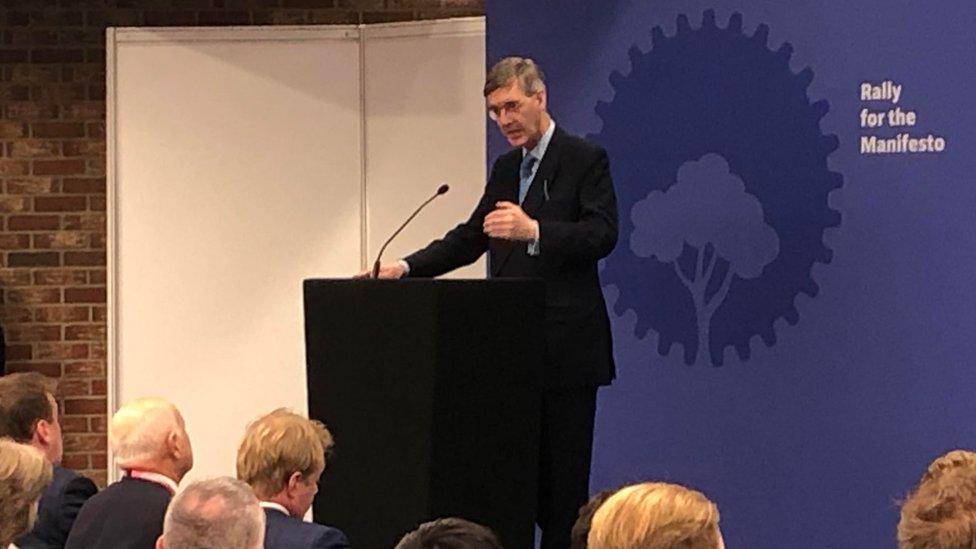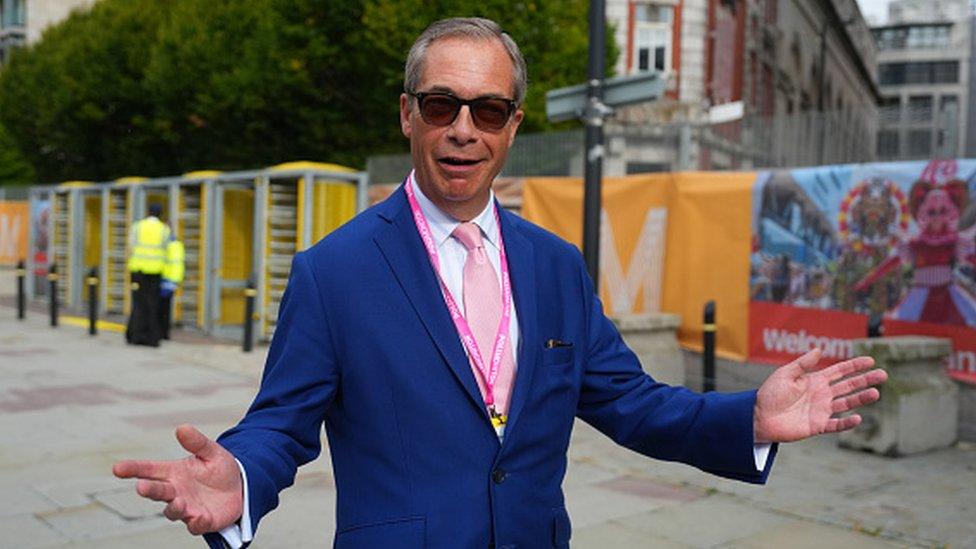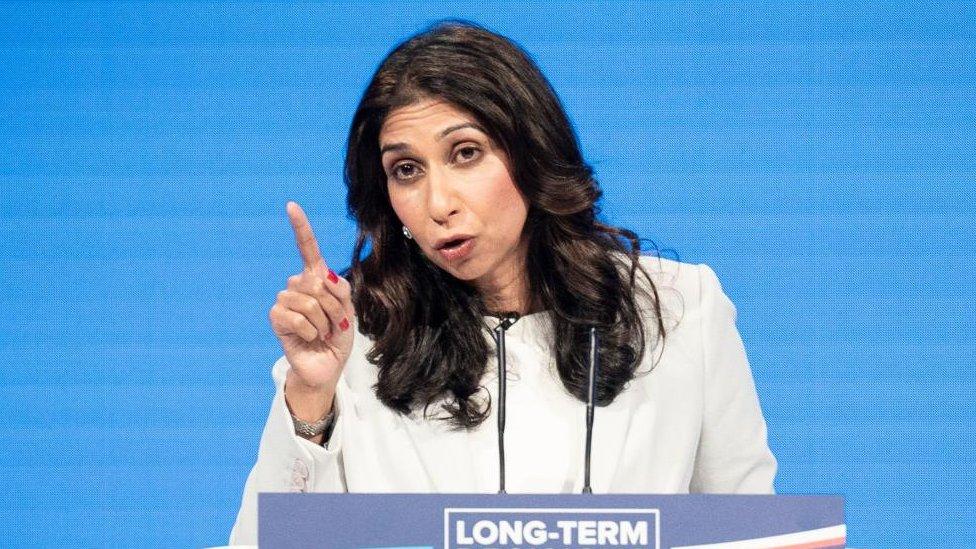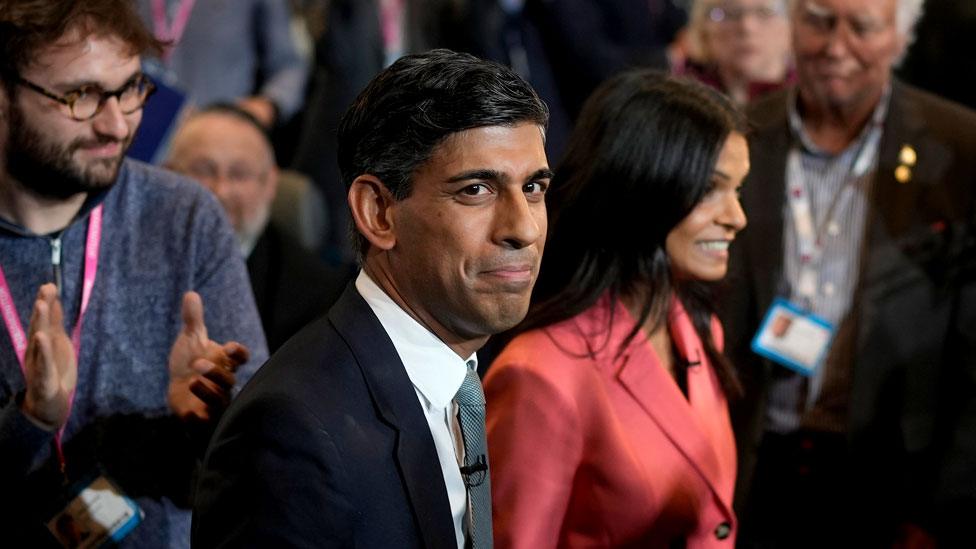Tory right lays ground for life after Rishi Sunak
- Published

Former cabinet minister Jacob Rees-Mogg was among the speakers at the New Conservatives rally
One by one, Tory MPs filed on stage to moot their ideas for revitalising the party's fortunes ahead of the next general election.
Whoops and choruses of "hear hear" follow proposals to slash taxes, curb immigration and ban gender ideology from these self-styled New Conservatives, MPs from the right of the party.
In a tub-thumbing speech, one of the speakers, MP Sir John Hayes, issues a rallying cry: "We must be unabashed and unapologetic about our conservatism."
So what's "new" about a brand of Conservative politics within a party that's been in power for more than 13 years?
The New Conservatives say they represent patriotic, no-nonsense values that stand "in contrast to the politics of metropolitan opinion".
It's a populist framing that wouldn't be out of place in a speech by former US President Donald Trump, and at this year's Conservative conference in Manchester, it's generated a lot of political energy.
Aside from HS2, the big stories of the conference have come from figures who would like to see the party move further to the right.
There was former Prime Minister Liz Truss, whose calls for tax cuts, deregulation and fracking were lapped up by Tory activists at a packed-out event.
Then there was the former Brexit Party leader, Nigel Farage, who didn't rule out re-joining the Conservatives after being feted by leading Tory Eurosceptics at fringe events and karaoke parties.

Nigel Farage received a hero's welcome at the Tory conference
Mr Farage was also the guest of honour at a gala dinner organised by the Conservative Democratic Organisation (CDO), a campaign group who see Prime Minister Rishi Sunak as an illegitimate party leader with no democratic mandate.
At that dinner, one CDO activist told me he thought Mr Sunak was "not a Conservative".
"He's not right of the centre," said Mike Payne, the CDO's regional chairman for Yorkshire. "I respect the fact that we have to appeal to the centre ground, but he's not a true Conservative."
Where is this discontent coming from?
Shrinking centre
There's still "enormous frustration" over the ousting of two prime ministers - Ms Truss and Boris Johnson - last year, Conservative commentator and activist Tim Montgomerie says.
He says there is a "hunger" for a "really conservative Conservative Party" among its membership, which is generally more right wing than most Tory MPs.
"In the absence of the leadership providing interesting policy ideas, the grassroots, the parliamentary party, will propose their own," he says.
At their rally for the manifesto, the New Conservatives pushed five policy pledges, including halving visas awarded to migrant workers, and withdrawing the UK from the European Convention on Human Rights (ECHR).
The party is "an oasis" of ideas, former Business Secretary Jacob Rees-Mogg told the rally.
Meanwhile, Tory MPs from the centre of the party were more reticent to make their ideas known.
At a drinks reception hosted by the Tory Reform Group, one said he wanted to talk about "making lives easier" rather than trans issues or leaving the ECHR.
In typically moderate fashion, another MP from the One Nation Conservatives group said his wing of the party would be putting forward policy proposals once the noise of the conference had died down.
Minister Lee Rowley isn't sure where these ideas will come from though.
"Traditionally ideas from the centre-right have come from Australia, America and the UK," the Tory MP told a think-tank event.
Since President Trump's election, he said, "the level of ideas from America have been pretty minimal and they're not my kind of ideas as a Conservative".
"So we have a gap in idea generation in centre-right politics."
There are caveats to consider though: those leaning towards radical positions on the left and right of politics often attract the most attention. The volume of their voices tends to be out of proportion with the number of voters they represent, while moderates with milder views are drowned out by the din.
Even so, there was "a lot of energy" for the politics of Ms Truss and Home Secretary Suella Braverman, Tory peer and columnist Daniel Finkelstein acknowledged.
"There's certainly a lot of work to do to move the Conservative Party [to the centre] and it isn't that much in evidence," Lord Finkelstein said.
Looking forward
What was in evidence was activist enthusiasm for the likes of Ms Braverman, who told a packed conference hall that politicians had been "too squeamish" to take action on immigration. The Business Secretary, Kemi Badenoch, has also turned heads of those thinking about the next generation of Tory leaders.
Both Ms Braverman and Ms Badenoch are tipped for the top job, should the party fail to win the next general election. With the Tories trailing Labour in the polls, that's a possibility.
In the next leadership contest, "the person who is broadly more right wing" of the final two candidates is most likely to win, said Paul Goodman, editor of the centre-right ConservativeHome website.

Tory activists were queuing out of the main hall to see Suella Braverman's speech
But in a warning to the party, Mr Goodman said: "What certainly won't work for the Conservatives or for anyone is for a party to become consumed with its own preoccupations, or become desperate to please a narrow media base."
One Whitehall insider said he suspected MPs on the right of the party were laying the groundwork for the direction of the party beyond the next general election.
While Mr Sunak focuses on "long-term decisions for the brighter future" (the conference slogan), other Tory MPs are thinking ahead too.
In his speech to the New Conservatives, Sir John Hayes said "we are embarking now on a post-liberal, post-globalist age", calling his allies on the right "a tip of an immense iceberg".
He told them: "When we are proud and prepared to say the things you have said today, not only will we be doing the right thing, but we'll be doing the popular thing.
"Make no mistake, our time has come. Our mission is clear. The future belongs to us."
Related topics
- Published4 October 2023

- Published5 October 2023

- Published4 October 2023
